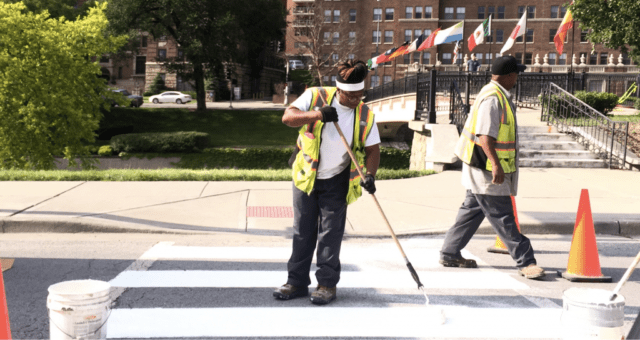The $800 million infrastructure bond going before Kansas City voters in April may not be the sexiest topic, but it could prove enormously beneficial for walkability in this sprawling Midwestern city.
While Kansas City policy makers were deciding how the $800 million would be spent, the advocates at BikeWalkKC were making the case to target things that would benefit residents most: street safety upgrades, investment in the city's woeful sidewalks, and repairs instead of road expansions.
Well, they made an impact. The city has unveiled its proposal, and rather than widening roads, it puts investments in sidewalks, bike lanes, and accessibility improvements for people with disabilities, BikeWalkKC reports. Here's a quick rundown of what's in the package:
1. $150 million for neighborhood sidewalksRepair and replace sidewalks in residential areas not on the main streets, mostly in front of individual homes. This will provide $7.5 million a year in brand new funding for sidewalks. BikeWalkKC is working with city leaders to develop a process for prioritizing sidewalk repairs over the next 20 years, focusing on criteria like poverty, access to bus stops, and Safe Routes to School. $150 million is a small but important first step towards the city’s $1 billion sidewalk backlog.
2. Sidewalk funding policy changeThe city will take over a significant portion of the cost of sidewalks, lifting a big burden off of homeowners – especially those on lower or fixed incomes. Homeowners currently paying assessments on sidewalks repairs will have that debt forgiven. This is a fundamental shift in philosophy and policy.
3. $450 million for street repairs, including Complete StreetsDozens of main arterial streets will be repaired, resurfaced, or rebuilt. This work will include repair of adjacent sidewalks on the main roads, and the inclusion of bike lanes on many streets. Most of this money will be spent on repairing existing streets. Only a couple new streets are on the list of potential projects.
4. ADA ImprovementsBoth city streets and public buildings like community centers and parks will get additional funds to speed up the city’s compliance with the Americans with Disabilities Act, improving mobility for people of all abilities.
The bond would also contribute to a workforce development program to train local residents in the construction trades.
More recommended reading today: City Block looks at recent research on how increasing the number and width of train doors could ease overcrowding on the DC Metro. And you can read outgoing Transportation Secretary Anthony Foxx's message to U.S. DOT employees at the agency's blog, The Fast Lane.






